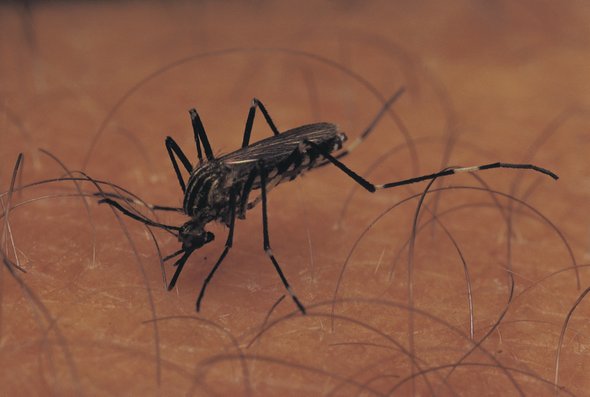(单词翻译:单击)
听力文本
Hi, I'm Scientific American podcast editor Steve Mirsky. And here's a short piece from the August 2018 issue of the magazine, in the section called Advances: Dispatches from the Frontiers of Science, Technology and Medicine.
Bloodthirsty by Rachel Nuwer
Mosquitoes are the world's deadliest animals, transmitting diseases that kill hundreds of thousands of people annually. Only the females bite, to acquire protein to make their eggs. But blood can also serve as a refreshing beverage on a hot, dry day.
A new study finds that dehydrated mosquitoes are more aggressive, land more often on hosts and feed more frequently than those with ready access to water. In quenching their thirst, they may also increase the spread of disease. The study is by Joshua Benoit, the biologist at the University of Cincinnati and his colleagues, it appeared in May in Scientific Reports.
Because some mosquitoes lay their eggs on water, researchers have long assumed that wetter conditions lead to more mosquito-borne illness. Yet recent studies have hinted at the opposite, linking increased transmission of diseases such as West Nile fever to droughts. Benoit and his colleagues' discovery helps to resolve these counterintuitive findings.

Benoit became interested in the impact of dehydration on mosquito-feeding behavior by accident: a worker dropped a container of water-deprived mosquitoes and noticed that they dive-bombed him with much greater vigor than usual.
The researchers studied three mosquito species that transmit yellow fever, Zika or West Nile fever. They exposed hundreds of insects to different temperatures and humidity levels in cages with or without access to water and nectar (mosquitoes' preferred sugar source). They then tested how often the pests chose to bite a "host": in this case a warm, waxy plastic membrane coated in artificial sweat and filled with chicken blood.
Within a few hours up to 30 percent of mosquitoes without water fed on their host's blood—compared with 5 to 10 percent of those that had water.
These findings have real-world applications for predicting rates of disease transmission.
That was Bloodthirsty by Rachel Nuwer.
参考译文
大家好,我是《科学美国人》播客编辑史蒂夫·米尔斯基。今天给大家介绍收录在本杂志2018年8月刊“进展:科学、技术和医学前沿快报”版块中的一篇短文。
《嗜血》 作者:瑞秋·努维尔
蚊子是世界上最致命的动物,它们传播的疾病每年会致数十万人死亡。只有雌蚊叮咬人,以此获取产卵所需的蛋白质。但在炎热干燥的日子,血液也可充当清爽的饮料。
一项新研究发现,脱水的蚊子更具攻击性,相比随时可以获得水源的蚊子,它们会更频繁地停在宿主身上,并且更频繁地吸血。在解渴的同时,它们可能还会加剧疾病的传播。这项研究由辛辛那提大学的生物学家约书亚·贝努瓦及同事开展,研究结果发表在《科学报告》5月刊上。
由于有些蚊子在水上产卵,因此研究人员长期以来一直假定更湿润的环境会引发更多蚊媒疾病。但是最近的研究暗示结果可能恰恰相反——西尼罗河热等疾病的扩散加剧与干旱有关。贝努瓦和同事的发现有助于解释这些反直觉的结果。
一次偶然的机会,贝努瓦对“脱水对蚊子吸血行为的影响”产生兴趣:一名工作人员摔了一个装有缺水蚊子的容器,然后发现那些蚊子对他进行了俯冲攻击,比平常要更有力量。
研究人员对传播黄热病、寨卡病毒和西尼罗河热的三种蚊子进行了研究。他们将数百只蚊子关进温度和湿度不同的笼子中,有些笼子里面有水和花蜜(蚊子偏爱的糖源),其他笼子里则没有。随后,他们对蚊子选择叮咬“宿主”的频率进行了测试:实验中的宿主是一个温热且光滑的塑料薄膜,上面涂满了人工汗液和鸡血。
在几小时内,没有水喝的蚊子中有多达30%吸了“宿主”的血——而有水喝的蚊子中只有5%到10%这样做了。
这些研究结果对预测疾病传播率具有现实应用意义。
以上是瑞秋·努维尔发表的文章《嗜血》。
译文为可可英语翻译,未经授权请勿转载!
重点讲解
重点讲解:
1. serve as 用作;可当…使用;充作;
The sofa will serve as a bed for a night or two.
沙发可以当床凑合一两夜。
2. quench one's thirst 解(渴);止(渴);
He stopped to quench his thirst at a stream.
他停了下来,在小溪边饮水止渴。
3. hint at 暗示;示意;
A character's appearance may hint at her past.
一名角色的形象可能暗示其过去的经历。
4. by accident 意外;偶然;
She discovered the problem by accident.
她碰巧发现了这个问题。


